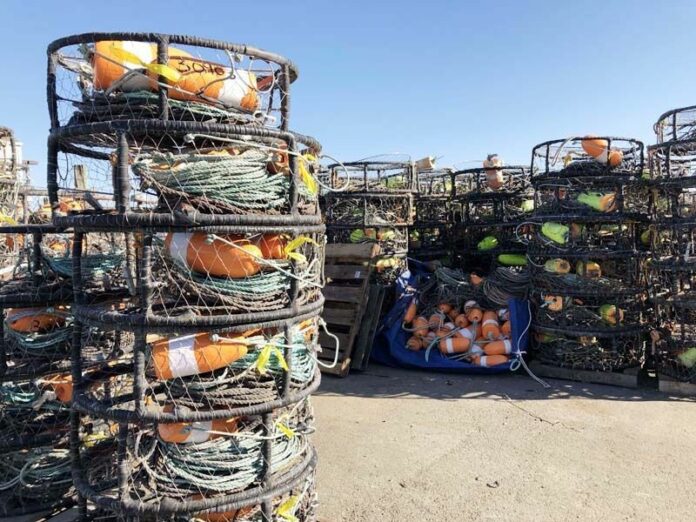
Crab pot gear poses potential harm to migrating whales
Just when folks were beginning to think of Thanksgiving plans and adding some Dungeness crabs to their tables, the California Department of Fish and Wildlife (CDFW) this week put a dent in everyone’s dinner plans by announcing a delay to the opening of the local commercial season which was set to open on Nov. 15. Due to the presence of whales within the local fishing grounds and the potential for entangling the whales in crab pot lines, the season opener has now been moved to Dec. 1.
Both the local crabbers and consumers look forward each year to the pre-Thanksgiving opening of the annual Dungeness crab season, focused locally at Bodega Bay. Recent helicopter flyovers of the local Pacific fishing grounds found hundreds of humpback and blue whale sightings. A single boat vessel recorded 118 different sightings, totaling a count of 345 humpback whales in the ocean waters between Point Reyes, Bodega Bay and north to Point Arena, according to a report issued this week by the CDFW’s Risk Assessment and Mitigation Program (RAMP) and the Dungeness Crab Fishing Gear Working Group.
“While no one wants to delay the season, CDFW and the Working Group feel a delay is necessary to reduce the risk of entanglement,” said CDFW Director Charlton H. Bonham. “The fleet has gone to great lengths to be more nimble in order to protect whales and turtles, and the results are promising. This year for the first time in a long time it looks like we don’t have to worry about domoic acid, which is good news.”
Domoic acid is found in excess amounts in warming ocean waters and its presence has closed entire crab seasons in recent years. Human digesting of crabs with high concentrates of domoic acid can be fatal.
The statewide recreational season for Dungeness crab is scheduled to open this Saturday, Nov. 7. Unlike previous years, domoic acid will not delay a season opener in the central or northern management areas. All sampling locations tested below allowable federal levels for domoic acid. The recreational season will open as planned with no health advisories in place.
Humpback and blue whales, along with leatherback sea turtles are protected under the federal Endangered Species Act and Marine Mammal Protection Act, explained senior CDFW senior biologist Ryan Bartling.
“The last couple of years we have observed fewer entanglements, but any ‘take’ of marine mammals (entanglement) is a violation. The new regulations are the foundation of the Conservation Plan that will support the Incidental Take Permit application. ‘Take’ levels will still be very low even when/if authorized.,” he said.
More detailed regulations were approved last summer to both offer better protection for the endangered species and to give fishermen more precise fishery management information to avoid more lengthy and wider closures. The regulations follow a 2017 lawsuit filed against the state by the nonprofit Center for Biological Diversity.
The Bodega Bay Dungeness crab fishery represents a $50-60 million annual harvest and still employs a fleet and hardworking, multi-generational families. In recent weeks, crews have been preparing their circular metal and wired traps that they had hope to begin dropping on the local ocean floor just ahead of Nov. 15.
The traps are attached to a floating buoy with 50-60 feet of rope or cables. Migrating whales are at risk of getting entangled in these ropes. There has been one confirmed entanglement this year and there were three last year, according to regional CDFW marine staff reports.
State Senator Mike McGuire led the passage of SB1308 in September 2018 which granted the CDFW the authority to close fishing grounds, restrict gear density and require specialized equipment. SB1308 also mandated the formation of new partnerships with CDFW and various fishermen associations and environmental groups. Local groups include the Bodega Bay Fishermen’s Marketing Association and the California Crab Association.








